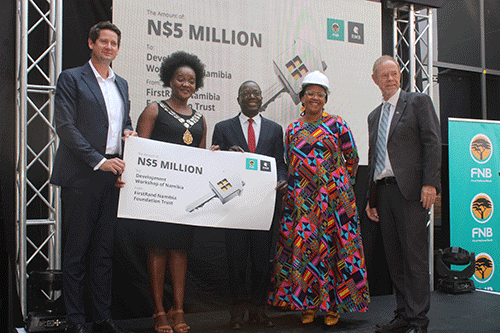The continued growth of informal settlements remains one of Namibia’s biggest developmental challenges. In this vein, FirstRand Namibia yesterday presented an investment of N$5 million for the country’s land and housing programme, through the Development Workshop of Namibia.
The Development Workshop of Namibia (DWN)’s land and housing programme supports local authorities by providing partially serviced land and affordable residential land, thereby offering an alternative to informal housing. In addition, FNB Namibia through its home loan department is involved in and supports access to funding for houses.
At the event, DWN trustee Ted Rudd said the programme allows low-income earners to own property with a title deed with which they can invest incrementally and pass on wealth to future generations.
At the same event, Windhoek mayor Sade Gawanas said: “When I look at informal settlements, I see deplorable conditions, wastage of water and unconducive environments.” She advised the situation should be seen as an opportunity that can be solved and not a problem that is beyond solution. Gawanas also stated the country is making progress in solving the housing crisis and related issues.
At the same occasion, Urban and Rural Development minister Erastus Uutoni, assured that government has redoubled its efforts in ensuring communities have a roof over their heads. He further called on the private sector to help alleviate the country’s housing backlog.
Sharing the same sentiments as Gawanas earlier this year, Popular Democratic Movement (PDM) president, McHenry Venaani, described Namibia housing situation as distressing, specifically informal settlements that he said are “shocking”.
He made these remarks in the National Assembly while motivating his motion for the house to debate alternative housing financing schemes.
“Currently, there are 285 informal settlements in towns across Namibia, meaning 40% of its urban inhabitants or 216 000 urban households are informally settled, which is indicative of the high urbanisation rates across the country. The living conditions in these informal settlements can at best be described as shocking, deplorable, and intolerable,” he labelled.
Venaani stated residents of informal settlements often live without water, sanitation facilities, without security of tenure, and in constant fear of eviction.


